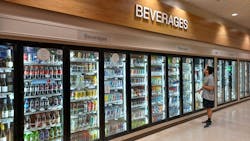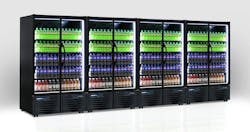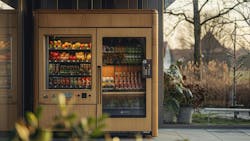How commercial refrigeration influences consumer behavior in beverage retail sales
Commercial refrigeration serves a dual purpose for retail beverage sales: Beyond its fundamental role of preserving a cold, delicious drink, refrigeration plays a vital part in the presentation of beverage products.
This transformation in the role of commercial refrigeration reflects a broader shift in the beverage industry. Preserving product quality and maintaining ideal drink temperatures — while still core functions — have been augmented by the need to attract and engage customers through visually appealing displays and efficient layouts.
Refrigeration system design is no longer merely a technical consideration; instead, it is an essential aspect of beverage retail strategy. The layout and functionality of the refrigeration units must be carefully planned to align with the retailer's overall aesthetic and branding. This includes considerations such as the choice of materials, lighting, temperature control and even the placement of specific beverages within the refrigeration units.
Modern consumers demand convenience, and a well-designed refrigeration system can facilitate quicker decision-making and ease of access to the products they love.
The art of cold display
The evolution of commercial refrigeration and its current influence on beverage shopping behavior is profound. Several factors shed light on this.
Visibility and lighting. Modern commercial refrigerators come with enhanced LED lighting and clear glass that accentuate beverage product appeal. The way products gleam and appear fresh under these lights makes them more enticing, often prompting unplanned purchases.
Ergonomic designs. The strategic design of commercial refrigerators emphasizes ergonomics. Items placed at eye level in easy-to-open fridges get more attention. The refrigeration industry's acknowledgment of this fact has led to adjustable shelving and placement solutions.
Temperature control. Commercial refrigeration advancements help ensure that beverage products are stored at optimal temperatures. This extends shelf life and maintains product quality and taste. When consumers feel the cold burst of air while opening a refrigerated section or see a perfectly chilled beverage, it triggers a purchase impulse.
Strategic product grouping. Advanced refrigeration solutions allow for better zoning — beverages with dairy, sports drinks, organic with organic, hemp and kombucha, carbonated drinks, caffeinated, beer, and alcoholic beverages. The strategic grouping, powered by adaptable commercial refrigeration designs, offers a smoother shopping experience, making additional purchases more likely.
In addition to cooling, commercial refrigeration can integrate modern technology, support retailers’ design philosophy and affect consumer psychology.
Efficiency and control. Modern refrigeration units have embraced digitization. With the incorporation of digital thermostats, units maintain an exact temperature, ensuring that products remain at optimal taste. This precision also helps in conserving energy.
IoT integration. With the Internet of Things (IoT), many refrigeration units can be remotely monitored. This means anomalies can be detected early, and maintenance can be scheduled proactively, reducing downtime.
Lighting and color theory. An often-overlooked component of beverage refrigeration is lighting. Proper illumination can make beverage products look more appealing. When color theory is applied, the refrigeration unit design can influence purchasing decisions and product sales.
Refrigeration and retail profits
Return on investment. While there’s an initial cost for modern retail refrigeration merchandisers, they can deliver long-term gains in terms of reduced wastage, increased sales and lower energy bills.
Reducing waste. An effective refrigeration system ensures products have a longer shelf life, which means fewer items are discarded. Where margins can be thin, this waste reduction can improve profitability.
Inventory management. Modern retail refrigeration merchandisers have inventory management features to monitor stock levels. This helps ensure that popular items are always in stock for consistent sales.
Consumer influences
In the age of information, consumers have become more discerning, and their expectations in the beverage industry have evolved. With an emphasis on health and organic living, shoppers prioritize taste and freshness. They are willing to pay a premium for beverage products they perceive as cool and deliciously thirst-quenching, and this perception can be influenced by the refrigeration state and design. For instance, dairy beverages illuminated in a way that emphasizes their purity and freshness can be more appealing. The color and design of the shelving, the clarity of the glass, and the lighting used can all influence a shopper's decision to purchase.
A clean, modern, and well-maintained refrigeration unit instills confidence in the merchandisers’ cleanliness and quality.
The relationship between commercial refrigeration and consumer behavior is becoming increasingly intertwined. As commercial refrigeration evolves to be more adaptable, visually appealing, and efficient, its role in directing and influencing consumers' purchasing decisions grows.
About the Author

Randy Skyba
Vice president of sales and marketing, Due North
Randy Skyba is the vice president of sales and marketing for Due North. Due North creates refrigerated, retail merchandising solutions that maximize its customers’ success.


